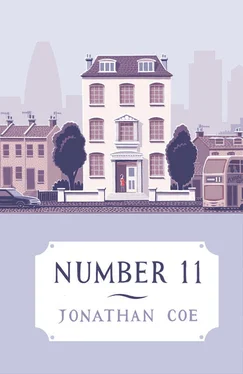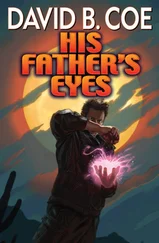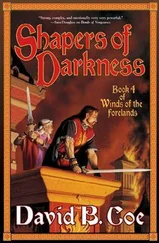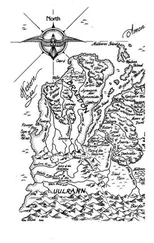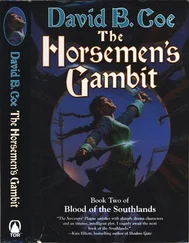‘Because of Roger, yes.’
‘You knew him?’
‘No. I never knew him. I came after he died.’
Briefly, just as they entered the village, a few glimmers of February sunlight broke through the clouds. On their left, the hedgerow tapered away. A triangle of lawn came into view, at its apex a war memorial flanked by two tubs of early primroses. The road curved around it, and after another fifty yards or so Keisha swung the car sharply right, into a short, loosely gravelled driveway that ended at the front door of a picture-perfect thatched cottage, its buttery-yellow, Cotswold-stone walls draped in curtains of wisteria. As soon as the car engine was turned off, the silence seemed chilling, absolute.
‘So, here we are. You all right with your bag?’
It seemed a silly question: Rachel’s tiny holdall was three-quarters empty. She followed Keisha to the front door which, before they had even had time to touch the handle, was thrown open from inside. There, standing in the darkened, flagstoned hallway, was a brown-haired boy of about five or six, who hurled himself at the nanny and crushed her in his arms without saying a word.
‘Hello, beautiful,’ Keisha said. ‘Did you miss me?’
‘You must be Harry,’ said Rachel, reaching out to shake his hand with mock-ceremony, but he ignored her and turned back towards the kitchen, pulling Keisha after him as forcefully as he could.
Rachel was left alone in the hallway. There was a steep, uncarpeted wooden staircase to her left, and three doors at the far end of the hallway, one leading straight ahead into the kitchen, the other two closed. For a moment, the sight of these three doors gave her a flickering sense of déjà vu, but it passed before she could decide whether it arose from a real or a phantom memory. What should she do? It would feel wrong to start calling out Laura’s name. She had been expecting Keisha to announce her arrival, but instead, she could see through the kitchen window that the nanny had already been dragged out into the garden by Harry, and he was trying to involve her in some sort of ball game.
Tentatively, still carrying her holdall, she crossed the flagstones in the direction of the kitchen. Pausing outside the two closed doors, she thought she could hear, from behind one of them, the muffled clicking of keys being tapped on a computer keyboard. She pushed the door open and found herself looking into Laura’s study. Laura herself had her back to the door. She was working at a desk placed in front of a large leaded window, and she was wearing headphones as she worked. She seemed unaware of Rachel’s presence. Through the window Rachel could see a further view of the garden — a sparse expanse of lawn rolling down towards a scruffy border which hinted at a stream beyond — making her suspect for the first time that the house and its grounds might be larger than she had thought. The sun was again doing its best to break through the clouds, throwing occasional patches of light on to the grass.
Rachel was still wondering what to do next when Laura, sensing her presence at last, swivelled round in her chair, took off the headphones and rose to her feet in greeting.
‘Hello, I didn’t hear you come in. Did you have a good journey? Did Keisha look after you? Where’s she got to?’
‘Outside with Harry.’
‘Come on, I’ll get you some coffee.’
In the kitchen, decanting coffee from a frothing, bubbling, gleaming chrome-plated machine, Laura said again: ‘I’m sorry I didn’t hear you. I meant to have hit my word target hours ago but the dreaded emails intervened as usual. They never stop — not even on a Saturday. So I’m afraid I’ve still got a bit to do.’
‘It’s nice to know lecturers have to set themselves word targets as well,’ said Rachel. ‘I thought that was just lazy students.’
‘Hardly,’ said Laura. ‘I promised myself five hundred words today. But I’ll do nowhere near that, of course.’
‘What are you writing about?’
‘Well … I don’t really know. And therein lies the problem, of course. I’m trying to carry on with a project my husband began. I suppose you’d say it was about paranoid fiction. With particular reference to recent British sci fi. And even more particular reference to …’ (she looked embarrassed) ‘… the Loch Ness Monster.’
Rachel was surprised. ‘Sounds fun,’ she said. ‘But quite a long way from Milton.’
‘Yes, well, the faculty isn’t too wild about it,’ said Laura, passing her a mug of treacly black coffee. ‘I’m sure they’d rather I just wrote the fifteen thousandth article on Lycidas — but … well, you have to go wherever your interests take you, don’t you?’
While Laura returned to the study to continue writing, Rachel took her coffee outside. As she had expected, the garden was impressive, with the generous lawn dominated, at its centre, by a classical stone fountain more than six feet high, although no water was cascading today over its three lichen-encrusted tiers. Harry and Keisha were playing down by the stream and took no notice of Rachel as she found a rickety wooden bench next to a rhododendron bush and sat down on it, positioning herself carefully between the many splashes of bird shit. Now that the sun seemed to have disappeared for good, it promised to be a cold afternoon. She shivered slightly.
It was an odd feeling, being here at her tutor’s house. Had she crossed a boundary, by coming? Had Laura crossed a boundary, by inviting her? She had not asked herself these questions before, and it was a bit late to be asking them now. Instead of welcoming her, Laura seemed to have viewed her arrival as an interruption, and for that matter the whole atmosphere of the house and the village made her feel like an intruder. The train ride to Didcot had taken only fifteen minutes and yet, thanks to the stillness and isolation of this place, the relative bustle of Oxford itself seemed already thousands of miles away. It wasn’t just a question of distance, either: Rachel felt, somehow, that in the last hour she had made a long journey through time, back to some far-off, half-forgotten era in her early life. To her childhood, even? This garden certainly bore no resemblance to her mother’s cramped old patio garden in Leeds; and it was at least three times the size of her grandparents’ garden in Beverley, where she had also spent a good many summers. No, these were not the images that were coming to mind this afternoon, as she sipped her coffee cautiously and looked around her. But still, there was an unmistakable aura of childhood about this place: not a badly off, urban, South Yorkshire childhood, such as Rachel’s had been, but a cosseted, Home Counties, 1950s childhood, of the sort with which Rachel was also familiar, if only in a second-hand way, through countless vintage children’s novels which had been her favourite choice of reading matter at the local library when she was growing up. It was all here: the spreading cedar tree which just cried out for a tree house to be built amidst the cluster of its lower branches; the shallow stream at the edge of the lawn, traversed by a footbridge, ideal for those long Sunday afternoon games of Poohsticks; the ramshackle shed which could, without too much effort or imagination, be converted into the makeshift headquarters of a junior detective club. And above all, that fountain: looking a little derelict and melancholy now, but otherwise the perfect centrepiece for a garden which felt eerily like a stage or a film set, on which idealized vignettes of a middle-class childhood were designed to be acted out. That would explain Rachel’s own growing sense of unreality, at any rate.
After another fifteen or twenty minutes, Laura beckoned her inside and showed her up to her room. It was on the second floor (she had not even realized there was a further floor) and turned out to be a low-ceilinged but otherwise spacious bedroom running the whole depth of the house, with windows looking out over both the front and the back gardens. The room should have been cosy but there was an airlessness about it, and a feeling of neglect. The books which spilled out from shelves ranged along every wall were sheened with a fine layer of dust. Glancing at them, Rachel could see that they were mainly devoted to cinema history and film theory.
Читать дальше
